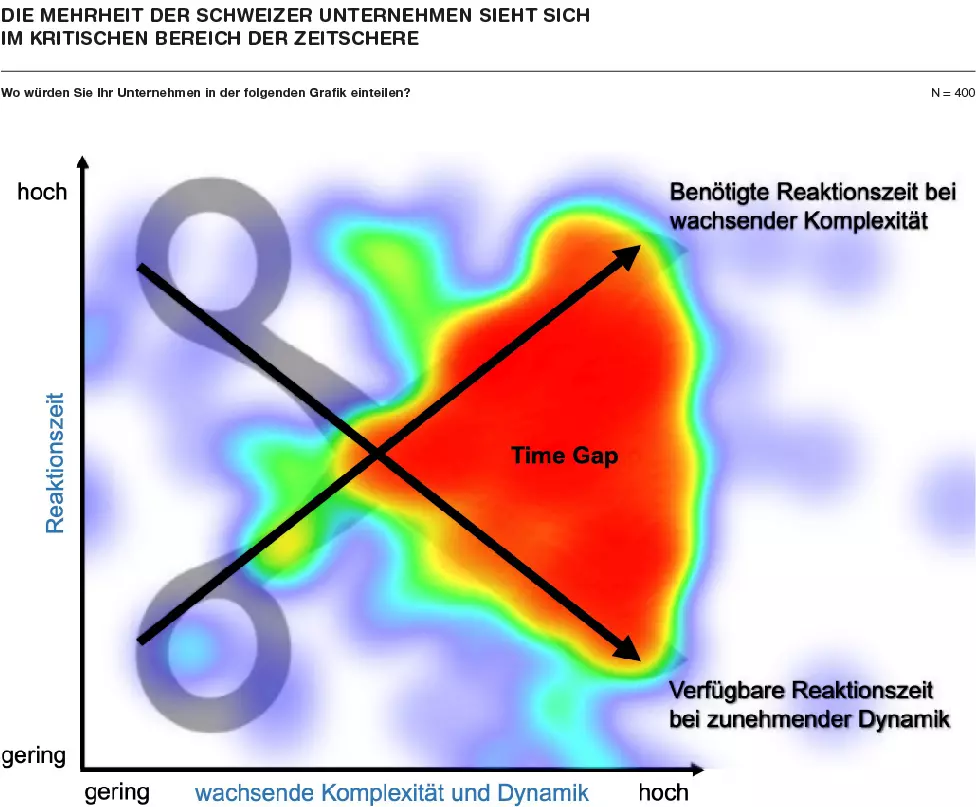2019 Swiss Marketing Leadership Study: complex business processes and time pressure pose obstacles at Swiss companies
As processes become increasingly complex, marketing professionals need more time to develop concepts and strategies. At the same time, escalating business dynamics mean they must implement solutions faster.
This year’s ZHAW Swiss Marketing Leadership Study (in German) looks at complexity and dynamics in marketing and has put its finger on major problems of our time. The majority of Swiss companies claim that faster business dynamics mean they lack the time necessary for their work. The most commonly named challenges include intensified competition, increased digitisation in society and changed consumer behaviours. Although the majority of Swiss businesses wish to react to the challenges within a reasonable timeframe, nearly half of the surveyed firms say they are unable to implement as quickly as needed. The study used a time-gap chart to depict the simultaneous processes of rapidly changing conditions and increasing complexity in the business world. Of the 400 companies surveyed, most see themselves in the critical zone.
Experimentation as a new strategy
In future, it won’t be enough for successful enterprises to continually develop their knowledge. They also have to actively make use of it in order to generate competitive advantages. This so-called “absorptive capacity” of a business is a core resource for driving innovation, and the study’s findings underscore the importance of collaborative and absorptive capacities of companies. The ability to collaborate is regarded as one of the key prerequisites for a company’s absorptive capacity, but many Swiss companies still find precisely external collaboration difficult. Great efforts are indeed being made, but shifts in corporate culture are also required. Companies must reconsider internal structures and adapt them in order to master the coming challenges. A strategy of trying and experimenting is the best path forward – innovative and unconventional thinkers now have an excellent opportunity to contribute their ideas.
Outdated vertical communication structures and information silos
To supplement the results of the quantitative study, an additional survey of 14 Chief Marketing Officers (CMOs) was conducted; in qualitative interviews, the CMOs from different branches were asked questions about the same subject area. The CMOs stressed the importance of agility, new company structures and uncompromising client-oriented practices, in addition to better use of available (customer) data via modern technologies. Actively pursued collaboration is equally important, they said, but information silos are still very prevalent in Swiss businesses, as is not thinking outside the box. Earlier, marketing was at the end of a long value-added chain; today, CMOs must assume responsibility for growth targets and company transformation too. Uniting creativity with analytical capabilities will be a job requirement for future CMOs; they will also need a flair for technology and a willingness to collaborate.
Study design
A total of 400 medium-sized and large businesses participated in the quantitative survey that formed the basis of the 2019 Swiss Marketing Leadership Study. The target group was defined as marketing leaders (proprietors and executives, as well as marketing, customer-service and product marketing professionals). The 400 online questionnaires were programmed and then distributed to a mix of companies from various branches and sizes by a large online panel provider. In keeping with the study’s aims, the statistical population of the study consisted essentially of medium-sized and large companies in Switzerland, and specifically of enterprises with at least 50 employees. Governmental and agricultural operations were excluded.
Due to research-related and economic constraints, the survey was conducted in German and French only. For the first time this year, a qualitative survey was conducted with 14 CMOs from major Swiss companies to complement the broad, quantitative data collected and go into greater depth. The 14 interviewees held either the role of Chief Marketing Officer or an equivalent position. The results of the quantitative study served as the starting point for the interviews.
Contact
ZHAW School of Management and Law, Institute of Marketing Management, Prof. Dr. Brian Rüeger, tel. 058 934 68 75, email: brian.rueeger@zhaw.ch
